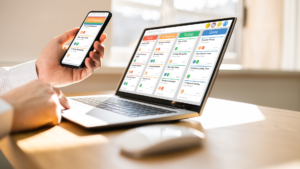Professional Development
Leveraging Networking in Coworking Spaces: A Game-Changer for Solo & Small Firms
For solo practitioners and small firms, building meaningful connections can be the difference between staying stagnant and scaling up. That’s where coworking spaces become a game-changer.
Unlike traditional office setups, coworking environments naturally foster collaboration and community. Whether it’s a conversation over coffee or a casual chat in the hallway, these everyday moments can lead to powerful referrals, partnerships, and fresh business ideas.
🔗 Here’s why networking in coworking spaces works:
- Shared mindset: You’re surrounded by driven professionals who get the hustle.
- Organic connections: No awkward networking events—just natural interactions in shared kitchens, lounges, and events.
- Cross-industry exposure: You meet people outside your bubble—marketers, designers, tech folks, even other legal professionals.
- Built-in credibility: When someone in your space recommends you, their trust rubs off on you.
If you’re a solo lawyer or part of a small firm looking to grow, don’t overlook the value of your coworking community. Make time to talk to your neighbors, attend on-site events, and get involved. You never know where your next client—or collaborator—might be sitting.
#Networking #CoworkingCommunity #SmallFirmGrowth #SoloLawyer #LegalNetworking #ProfessionalDevelopment
How Coworking Spaces Empower Lawyers Through Collaboration & Innovation
In recent years, coworking spaces have become a revolutionary force in the business world, offering an alternative to traditional office environments. This shift is not only affecting tech startups and creatives but also transforming the legal profession. Lawyers, like professionals in any other industry, are increasingly turning to coworking spaces to foster collaboration and ignite innovation.
1. Networking Opportunities: A Collaborative Environment Coworking spaces are a hub for professionals from a variety of industries. For lawyers, this means more than just having access to a desk and high-speed internet. These spaces create a unique environment where attorneys can network with other legal professionals, entrepreneurs, and business owners. This diverse ecosystem allows lawyers to collaborate on ideas, share expertise, and potentially discover new avenues for business growth. By connecting with people from various fields, lawyers can stay updated on industry trends, gain referrals, and strengthen their professional network.
2. Flexibility to Innovate Traditionally, law firms operated in rigid office setups, with long hours spent in isolated spaces. Coworking environments, however, offer lawyers the flexibility to break free from these constraints. They provide flexible memberships, allowing lawyers to choose the amount of space and resources they need, whether it’s a private office for confidential client meetings or a hot desk to collaborate on a project. This flexibility encourages lawyers to think outside the box and explore innovative ways to serve clients. By eliminating the overhead of maintaining a traditional office, lawyers can reinvest those savings into technology, marketing, or business development.
3. Access to Cutting-Edge Technology Modern coworking spaces often come equipped with advanced technology—high-speed internet, state-of-the-art printing, and video conferencing facilities—that may otherwise be too expensive for solo practitioners or small firms. With these resources at their fingertips, lawyers can offer better service to clients, hold virtual meetings, and stay competitive in an ever-changing legal landscape.
4. Enhanced Work-Life Balance Working in a coworking space also promotes a healthier work-life balance. The dynamic and flexible nature of these spaces allows lawyers to avoid the burnout often associated with traditional office settings. Many coworking spaces offer amenities like wellness programs, coffee lounges, and social events, which help create a more balanced and productive workday. This can lead to a more fulfilling career and greater job satisfaction, which ultimately benefits both lawyers and their clients.
Conclusion Coworking spaces are reshaping the way lawyers work, enabling them to collaborate, innovate, and grow their practices in ways that were once unimaginable. With a focus on networking, flexibility, technology, and work-life balance, these spaces empower lawyers to stay ahead of the curve and deliver exceptional service to their clients.
How to Improve Client Communication and Satisfaction
Effective client communication is the cornerstone of a successful business. Clear, responsive, and proactive interactions not only build trust but also enhance client satisfaction. Here are three key strategies to improve client communication and keep them engaged:
1. Active Listening & Clear Messaging Clients want to feel heard and understood. Practice active listening by paraphrasing their concerns, asking clarifying questions, and responding with clear, concise messaging. Avoid jargon and tailor your communication to their level of understanding.
2. Set Expectations & Follow Through Be upfront about timelines, deliverables, and any potential challenges. Keeping clients informed at every stage of a project builds confidence and prevents misunderstandings. If an issue arises, communicate promptly and offer solutions.
3. Personalize & Stay Accessible Clients appreciate a personalized approach. Use their preferred communication channels, address them by name, and remember key details about their needs. Being accessible and responsive—whether via email, calls, or meetings—demonstrates commitment and reliability.
By fostering transparent and thoughtful communication, businesses can strengthen client relationships, increase satisfaction, and encourage long-term loyalty. Investing in communication is investing in success!
Celebrating Women in Law: Empowerment and Collaboration in a Shared Legal Workspace
This Women’s Day, let’s take a moment to celebrate the incredible contributions of women in law—whether they are leading firms, working as paralegals, or charting their own path in the legal world. In a shared workspace exclusively for lawyers and paralegals, we not only witness their talent but also see firsthand the power of collaboration, support, and mentorship.
Working alongside brilliant female professionals in law, we are reminded of how vital it is to foster environments that champion diversity and inclusion. A workspace dedicated to legal professionals gives women the unique opportunity to share experiences, gain insights, and lift each other up.
It’s more than just about providing a place to work. It’s about creating a community where women in the legal industry can thrive. From discussing strategies on balancing career and personal life to breaking barriers in legal fields traditionally dominated by men, our shared workspace serves as a hub for growth and empowerment.
As we celebrate Women’s Day, let’s reflect on the progress made, and the work that still lies ahead. Together, we can continue building a legal landscape that supports women at every stage of their careers.
#WomensDay #WomenInLaw #LegalCommunity #DiversityAndInclusion #WomenEmpowerment
Secure File-Sharing Apps for Lawyers and Legal Teams
In the legal profession, confidentiality is everything. Whether sharing contracts, case files, or sensitive client data, legal teams need secure file-sharing solutions that ensure privacy, compliance, and efficiency.
Here are some top choices:
🔹 ShareFile by Citrix – Tailored for law firms, offering encrypted storage, client portals, and compliance with legal standards.
🔹 Egnyte – A hybrid cloud platform with strong security controls, perfect for large teams handling sensitive data.
🔹 Tresorit – End-to-end encryption ensures only authorized parties can access shared files, even if intercepted.
🔹 Box – A widely trusted cloud service with advanced security features, integrations, and workflow automation for legal teams.
🔹 OneDrive for Business – Microsoft’s solution with built-in compliance tools and seamless Office 365 integration.
🔹 NetDocuments – A legal-specific document management system designed for law firms needing high security and collaboration.
When choosing a platform, prioritize encryption, access controls, compliance (e.g., GDPR, HIPAA), and user experience. Secure file-sharing isn’t just about convenience—it’s about protecting client trust and meeting ethical obligations.
Compliance Tools for Lawyers: Staying Ahead in the Digital Era.
In today’s fast-paced legal landscape, compliance is more critical than ever. With increasing regulations, data privacy concerns, and evolving client expectations, lawyers must leverage technology to stay ahead. Here’s how compliance tools can help streamline legal workflows and mitigate risks.
Key Compliance Tools for Lawyers:
- Case Management Software – Tools like Clio and MyCase centralize client data, track deadlines, and ensure regulatory compliance.
- AI-Powered Contract Review – Solutions like Kira Systems and LawGeex use AI to review contracts, flag risks, and enhance accuracy.
- E-Discovery Platforms – Software like Relativity and Logikcull simplifies document review, ensuring compliance with data privacy laws.
- Cybersecurity & Data Protection – Tools like Proofpoint and iManage secure sensitive client data and prevent breaches.
- Regulatory Compliance Trackers – Services like Thomson Reuters Compliance Learning help firms stay updated on legal changes.
Why It Matters
Adopting the right compliance tools not only enhances efficiency but also reduces the risk of regulatory violations. In an era where digital transformation is reshaping legal practice, staying ahead means embracing innovation.
#LegalTech #Compliance #Law
Transform Your Legal Calendar with These Scheduling Apps
Managing a legal calendar can be a daunting task, especially with multiple deadlines, client meetings, court dates, and internal team discussions. However, the right scheduling apps can streamline your workflow and enhance productivity, helping you stay on top of your commitments.
Here are some top scheduling apps tailored for legal professionals:
- Clio Manage Specifically designed for law firms, Clio Manage offers a comprehensive calendar that integrates with case management. It helps attorneys track deadlines, manage appointments, and maintain organized schedules. With cloud-based functionality, you can access your calendar from anywhere, ensuring you’re always on top of critical tasks.
- LawToolBox LawToolBox is known for its legal-specific calendaring and deadline management. It integrates seamlessly with Microsoft 365 and Google Calendar, providing automatic updates for court rules and jurisdictional changes. It’s an invaluable tool for staying compliant with state and federal deadlines.
- MyCase MyCase offers a centralized legal practice management system with a robust calendar feature. You can easily sync appointments, deadlines, and meetings, while also sharing event details with clients. It’s designed to keep your practice efficient and communication clear.
- PracticePanther With PracticePanther, you get a fully integrated legal practice management tool that includes a dynamic calendar. The app sends reminders and keeps all your tasks organized in one place. It’s a great choice for solo practitioners and small law firms seeking efficiency.
- Google Calendar + Zapier For a more customizable option, combining Google Calendar with Zapier allows you to automate various scheduling tasks. For example, you can set up triggers for appointment scheduling, meeting reminders, or syncing across multiple platforms.
By utilizing these tools, you can simplify your legal calendar, improve time management, and reduce the risk of missed deadlines. Investing in the right scheduling app is a small step that can have a big impact on your practice’s efficiency.
Top Productivity Apps for Paralegals in 2025
Paralegals are the backbone of legal operations, handling research, drafting, and case management under tight deadlines. Staying organized and efficient is crucial in this fast-paced field. Here are the top productivity apps every paralegal should consider in 2025:
1. Clio
Clio remains a leader in legal case management software. Its ability to streamline document management, case tracking, and client communication makes it a vital tool for legal teams.
2. Notion
Notion’s customizable workspace is perfect for creating to-do lists, tracking projects, and storing case-related notes. Its collaborative features also make team coordination seamless.
3. Trello
For visual task management, Trello’s boards and cards allow you to prioritize and monitor deadlines effectively. It’s great for managing multiple cases simultaneously.
4. CaseFox
Designed specifically for legal professionals, CaseFox offers time tracking, billing, and task management. It’s intuitive and helps save valuable time on administrative tasks.
5. Grammarly
Drafting accurate legal documents is critical. Grammarly ensures your writing is clear, error-free, and professional, making it indispensable for reports, contracts, and emails.
6. Adobe Acrobat
Handling legal documents often involves working with PDFs. Adobe Acrobat’s advanced editing and signing capabilities simplify the process, keeping you productive and organized.
7. Otter.ai
Transcription tasks can eat up a lot of time. Otter.ai converts spoken words into text in real-time, making it easier to document client meetings or interviews.
Why These Apps?
In 2025, efficiency and adaptability are key. These apps help paralegals reduce manual effort, minimize errors, and maintain organization in a demanding profession. By leveraging technology, you can focus on the work that matters most.
10 Must-Have Apps for Lawyers to Streamline Their Practice
In today’s fast-paced legal environment, staying organized, efficient, and connected is key. The right apps can make all the difference. Here are 10 must-have apps that every lawyer should consider:
- Clio Manage
A leading practice management tool, Clio helps track cases, manage billing, and streamline client communications—all in one place. - Microsoft OneNote
Perfect for jotting down case notes or brainstorming, OneNote syncs across devices, keeping your ideas accessible anytime. - Evernote
An organizational powerhouse, Evernote is great for storing research, legal memos, and important documents securely. - Fastcase
A go-to for legal research, Fastcase offers quick access to statutes, case law, and more, right from your phone. - Zoom
For virtual meetings and court appearances, Zoom ensures seamless connectivity with clients and colleagues. - Slack
Facilitate team communication and collaboration with Slack’s channels, messaging, and file-sharing capabilities. - Google Workspace
From managing your calendar to sharing case files, Google’s suite of tools keeps your workflow smooth and efficient. - Notion
An all-in-one productivity app for managing tasks, deadlines, and case timelines. - DocuSign
Simplify contract management with this app that allows secure electronic signatures on legal documents. - TrialPad
A courtroom presentation tool that helps you organize evidence, exhibits, and transcripts for powerful case presentations.
Embracing technology in your practice can save time, reduce stress, and enhance client service. Which app will you try first?
#LegalTech #LawyerApps #ProductivityTools #LawPractice
Networking Strategies for Legal Teams in Coworking Spaces
In today’s dynamic work environment, coworking spaces have become a hub for collaboration, innovation, and opportunity. For legal professionals, networking within these spaces offers unique benefits. Here are some effective strategies to make meaningful connections:
Leverage Shared Events Participate in workshops, seminars, or community events hosted by your coworking space. These gatherings are perfect for meeting diverse professionals, exchanging ideas, and staying updated on industry trends. Make it a goal to introduce yourself to at least three new people at each event.
Build Reciprocal Relationships Networking isn’t just about gaining referrals; it’s about creating mutually beneficial connections. Offer your expertise to other members. For instance, if someone mentions a contract challenge, share general advice or suggest useful resources. This positions you as approachable and knowledgeable.
Utilize Common Areas The lounge or coffee station isn’t just for breaks; it’s a networking goldmine. Casual conversations can lead to surprising opportunities. Keep your introductions brief and engaging to foster genuine interest.
Collaborate on Cross-Disciplinary Projects Many coworking members are entrepreneurs or startups who may need legal guidance. Offer to host a brief “Ask a Lawyer” session to build credibility and trust.
Stay Visible and Accessible Consistency matters. Regularly engage with the coworking community both online (via shared platforms) and offline. A friendly demeanor and openness to chat can make a lasting impression.
For legal teams, coworking spaces are not just workstations but vibrant ecosystems of potential clients and collaborators. By taking a proactive and relationship-focused approach to networking, you can strengthen your professional presence while adding value to your community.










